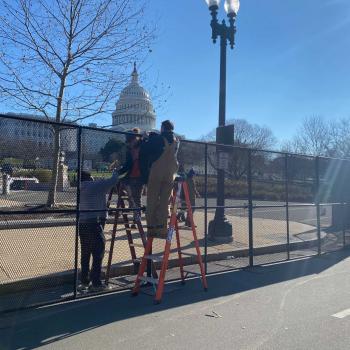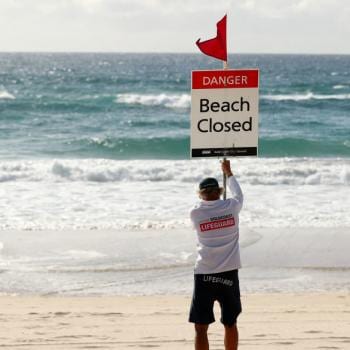Another odd aspect of President Obama’s speech in South Africa was his conflicting rhetoric about recent history and the accomplishments of liberal societies.
On the one hand, it is the best of times:
One hundred years ago. . . . South Africa was then less than a decade removed from full British control. Already, laws were being codified to implement racial segregation and subjugation, the network of laws that would be known as apartheid. Most of Africa, including my father’s homeland, was under colonial rule. The dominant European powers, having ended a horrific world war just a few months after Madiba’s birth, viewed this continent and its people primarily as spoils in a contest for territory and abundant natural resources and cheap labor. And the inferiority of the black race, an indifference towards black culture and interests and aspirations, was a given.
And such a view of the world – that certain races, certain nations, certain groups were inherently superior, and that violence and coercion is the primary basis for governance, that the strong necessarily exploit the weak, that wealth is determined primarily by conquest – that view of the world was hardly confined to relations between Europe and Africa, or relations between whites and blacks. Whites were happy to exploit other whites when they could. And by the way, blacks were often willing to exploit other blacks. And around the globe, the majority of people lived at subsistence levels, without a say in the politics or economic forces that determined their lives. Often they were subject to the whims and cruelties of distant leaders. The average person saw no possibility of advancing from the circumstances of their birth. Women were almost uniformly subordinate to men. Privilege and status was rigidly bound by caste and color and ethnicity and religion. And even in my own country, even in democracies like the United States, founded on a declaration that all men are created equal, racial segregation and systemic discrimination was the law in almost half the country and the norm throughout the rest of the country.
That was the world just 100 years ago. There are people alive today who were alive in that world. It is hard, then, to overstate the remarkable transformations that have taken place since that time. A second World War, even more terrible than the first, along with a cascade of liberation movements from Africa to Asia, Latin America, the Middle East, would finally bring an end to colonial rule. More and more peoples, having witnessed the horrors of totalitarianism, the repeated mass slaughters of the 20th century, began to embrace a new vision for humanity, a new idea, one based not only on the principle of national self-determination, but also on the principles of democracy and rule of law and civil rights and the inherent dignity of every single individual.
In those nations with market-based economies, suddenly union movements developed; and health and safety and commercial regulations were instituted; and access to public education was expanded; and social welfare systems emerged, all with the aim of constraining the excesses of capitalism and enhancing its ability to provide opportunity not just to some but to all people. And the result was unmatched economic growth and a growth of the middle class. And in my own country, the moral force of the civil rights movement not only overthrew Jim Crow laws but it opened up the floodgates for women and historically marginalized groups to reimagine themselves, to find their own voices, to make their own claims to full citizenship. . .
And with these geopolitical changes came sweeping economic changes. The introduction of market-based principles, in which previously closed economies along with the forces of global integration powered by new technologies, suddenly unleashed entrepreneurial talents to those that once had been relegated to the periphery of the world economy, who hadn’t counted. Suddenly they counted. They had some power; they had the possibilities of doing business. And then came scientific breakthroughs and new infrastructure and the reduction of armed conflicts. And suddenly a billion people were lifted out of poverty, and once-starving nations were able to feed themselves, and infant mortality rates plummeted. And meanwhile, the spread of the internet made it possible for people to connect across oceans, and cultures and continents instantly were brought together, and potentially, all the world’s knowledge could be in the hands of a small child in even the most remote village.
On the other hand, it is the worst of times:
. . . we also have to recognize all the ways that the international order has fallen short of its promise. In fact, it is in part because of the failures of governments and powerful elites to squarely address the shortcomings and contradictions of this international order that we now see much of the world threatening to return to an older, a more dangerous, a more brutal way of doing business.
So we have to start by admitting that whatever laws may have existed on the books, whatever wonderful pronouncements existed in constitutions, whatever nice words were spoken during these last several decades at international conferences or in the halls of the United Nations, the previous structures of privilege and power and injustice and exploitation never completely went away. They were never fully dislodged. Caste differences still impact the life chances of people on the Indian subcontinent. Ethnic and religious differences still determine who gets opportunity from the Central Europe to the Gulf. It is a plain fact that racial discrimination still exists in both the United States and South Africa. And it is also a fact that the accumulated disadvantages of years of institutionalized oppression have created yawning disparities in income, and in wealth, and in education, and in health, in personal safety, in access to credit. Women and girls around the world continue to be blocked from positions of power and authority. They continue to be prevented from getting a basic education. They are disproportionately victimized by violence and abuse. They’re still paid less than men for doing the same work. That’s still happening. Economic opportunity, for all the magnificence of the global economy, all the shining skyscrapers that have transformed the landscape around the world, entire neighborhoods, entire cities, entire regions, entire nations have been bypassed.
In other words, for far too many people, the more things have changed, the more things stayed the same. . . . a politics of fear and resentment and retrenchment began to appear, and that kind of politics is now on the move. It’s on the move at a pace that would have seemed unimaginable just a few years ago. I am not being alarmist, I am simply stating the facts. Look around. Strongman politics are ascendant suddenly, whereby elections and some pretense of democracy are maintained – the form of it – but those in power seek to undermine every institution or norm that gives democracy meaning. In the West, you’ve got far-right parties that oftentimes are based not just on platforms of protectionism and closed borders, but also on barely hidden racial nationalism. Many developing countries now are looking at China’s model of authoritarian control combined with mercantilist capitalism as preferable to the messiness of democracy. Who needs free speech as long as the economy is going good? The free press is under attack. Censorship and state control of media is on the rise. Social media – once seen as a mechanism to promote knowledge and understanding and solidarity – has proved to be just as effective promoting hatred and paranoia and propaganda and conspiracy theories.
So on Madiba’s 100th birthday, we now stand at a crossroads – a moment in time at which two very different visions of humanity’s future compete for the hearts and the minds of citizens around the world. Two different stories, two different narratives about who we are and who we should be. How should we respond?
One way to reconcile this odd mix of optimism and pessimism is to say that life is complicated, that you can have improvements in economic and political conditions and with them come other social problems. That’s true. But how do you say conditions have improved and things remain the same.
Why can’t it be that the West, democratic governments, and free markets responded to certain inequalities and self-corrected others only now to create a different set of dilemmas? That means that society really has changed and we have new problems. But to claim that we have the same old inequalities and bigotries that animated Africa at the beginning of the twentieth century is not accurate historically.
It does lead progressives to think that all of their efforts are part of one stream of good triumphing over evil, with the presence of evil showing that nothing has changed and meaning that the struggle must go on.
At the same time, that way of looking a social injustice doesn’t do justice to Christian teaching about the fall. Human sinfulness will always be present whether in the most socialist of societies or the most capitalist. The idea that history is moving to some harmonious arrangement where all injustice, hatred and inequalities will be gone is straight out of a fairy tale. A proper view of sin is no opiate of the people. Thinking progress will eliminate injustice is the real opiate.












